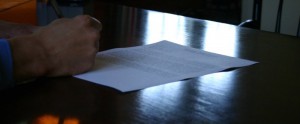SYNOPSIS
Learn about Julie Olsen’s work as both Registrar and Associate Dean of the College. Hear advice for branching out trying something off-the-wall during your time at Wabash.
http://youtu.be/INwwjvSmFfg
SELECTED TRANSCRIPT
Julie Olsen: Associate Dean of the College
0:30 Julie Olsen: I am the Registrar of the college, which entails the normal record keeping part of the academic world. I am also the Associate Dean of the college, where I deal with hiring, safety issues, and legal compliance cases as well.
2:20 When are we going digital with class registration?
There is nothing on the table at this point. I suspect at some point that it will happen. Right now it is actually more convenient for students to be coming through our office because we do a lot of assisting and advising when people come through our office. When students come through our office and they are not able to get the classes that they want, we are able to help them find other courses that they need.
3:20 What are some of the skills and talents you have to draw on?
I am an administrator and what that means to me is facilitating processes and making things go, trying to keep them smooth, efficient, and effective for people. That means you are always looking ahead and trying to understand how things could work and how they could work better. I also figure out how to work with people and different kinds of people and what it would take to help them do their jobs better.
4:20 How did you end up in your dual role that you are in now?
Julie Olsen: I was a chemist by training and I had taught off and on at the college. In the mid 1990’s when Don Herring became Dean of the College he came over and asked if I would work with him as an assistant to the dean of the college. There had not been any support staff in that office before and we initially agreed that I could do that. Our initial agreement was that I could resign from the position after a year or he could ask me to the leave the position after a year, but we never got to that point. I went to the Dean’s office in 1993. One of my first jobs was to put in place a monitoring report and assessment plan and to get it passed for accreditation. Another big task I took on during that time was beginning to co-chair the safety committee, which I still do. I looked at a lot of issues like dealing with blood borne pathogens, organizing chemical hygiene plans, and emergency plans. The college is legally required to have a number of safety plans in place, so I have gone about establishing a lot. I also began to assist the dean with the budgeting process. Under the dean of the college there are several hundred budgets and we worked our way through organizing those. We also set hiring procedures in place for hiring faculty. There had not been any written guidelines up to that point and we put those in place. I became registrar in 1998 after the current registrar retired, so that was kind of added to my mix of responsibilities.
6:55 What do you miss about teaching?
Julie Olsen: I have found that I have liked the administration much more. I had never imagined I would do that kind of work. It wasn’t something that occurred to me that I would enjoy. But there is a lot of the same kind of figuring how to do things and making things work that is also involved in teaching. Up until 5 or 6 years ago I still had a research lab going and had students working for me, so I wasn’t completely removed from teaching either.
8:12 What advice do you have for current students?
Julie Olsen: Find something you really like and imagine that you could see yourself doing for a long time. Life is too short to put yourself in a position to have to do things you don’t like. Find something that really appeals to you and is intellectually satisfying to you. While you are here in college this is probably your last chance to do some unusual things, either activities or course work that you are never really going to have an opportunity to access again, so go find some of that strange stuff and do it. You can make the most of your time here by looking broadly at what’s available and sampling it.
9:10 What advice do you have for students who want to end up in administrative work?
Julie Olsen: A student interested in administrative work will probably have to earn a PHD. People interested in a Dean’s position will typically have earned their PHD, taught for a while, and gradually worked their way over to administrative positions. On the registrars side you see two types of people in those positions. Some have come through an academic/ faculty role into the registrar’s position. While, others that have come up by working their way through a registrar’s office and have eventually come up to being a registrar.
12:20 When there is more bad than good what is your inspiration?
In the long run, being able to facilitate things and make things happen for the good. You work your way through difficult times and you figure out how to straighten things out and working with people to do that is satisfying. That’s a good thing to be doing.
13:12 What inspires you?
I don’t know if there is something that really inspires me, but sometimes when I watch old Star Treks and think about command structure, I think I would like to be Captain Kirk.
14:06 What’s one thing every Wabash student should do?
Pick one really off the wall course that you really wouldn’t imagine yourself normally doing and go in and try it.

